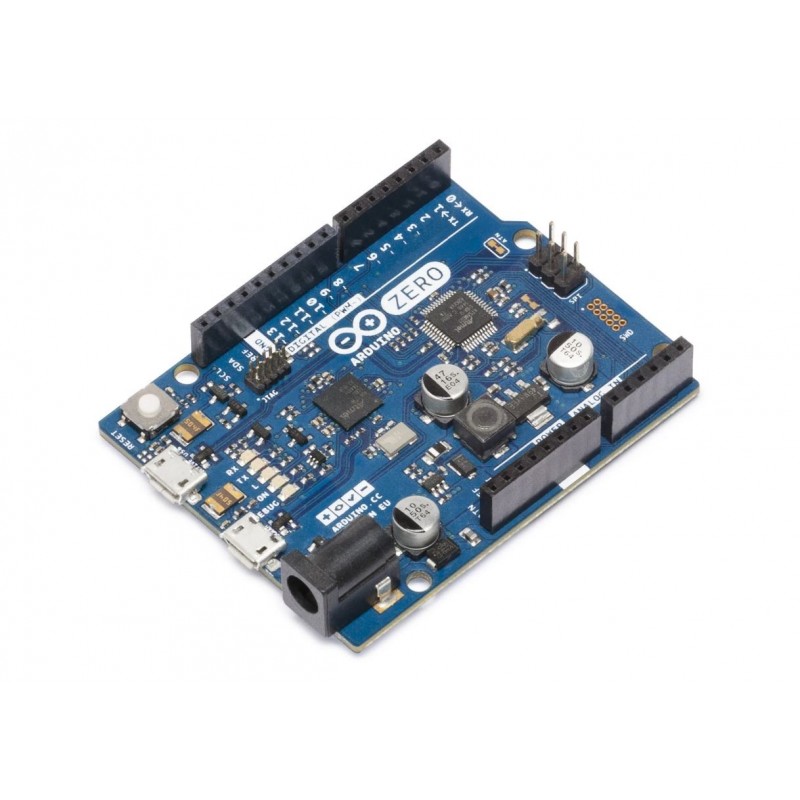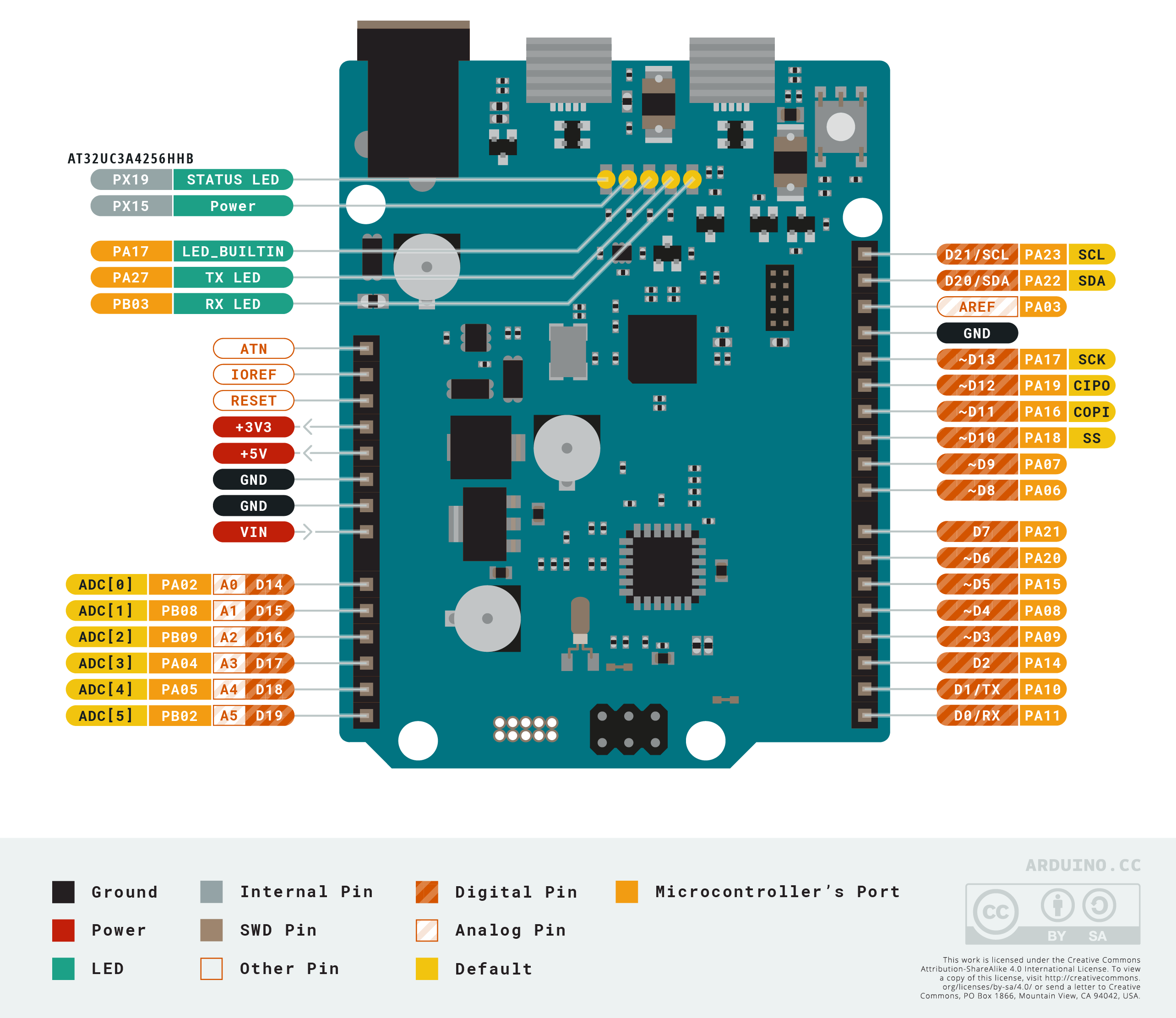





zł153.66 tax excl.
Development board with 32-bit ATSAMD21G18 microcontroller with ARM Cortex-M0 + core. Equipped with numerous peripheral systems, including UART, SPI, TWI (I2C) communication, analog inputs and outputs, and PWM outputs. Arduino ABX00003
Development board with 32-bit ATSAMD21G18 microcontroller with ARM Cortex-M0 + core. The system offers 256 KB of Flash memory, 32 KB of RAM memory and can operate at a clock frequency of up to 48 MHz.
The ARM Cortex M0+ core provides a 12-channel DMA controller that can offload the CPU from memory-intensive tasks, 32-bit real time counter (RTC) with clock/calendar function, 32-bit CRC generator, dual-channel Inter IC Sound interface ( I2S) and Peripheral Touch Controller (PTC).
The board uses an embedded Atmel Embedded Debugger (EDBG) which implements the SWD interface to program the SAMD21 microcontroller. Can be used with ATMEL Studio to gain full access to the microcontroller's memory and enable code debugging.

Arduino Zero has 20 IO pins that can be used as digital inputs or outputs. 10 of them can work as 8-bit PWM outputs, 6 as analog inputs (ADC converter), and one in analog output mode (DAC converter). In addition, on the connectors, the user has communication interfaces such as UART, SPI, TWI (I2C) and a built-in LED on pin 13.
Programming the board is done via the USB connector and using the Arduino IDE environment. The user also has the option of uploading a booloader used by the native USB port.
The Arduino Zero board extends the possibilities, providing increased efficiency, and is perfect as an educational tool for learning how to create 32-bit applications. It will be used in the field of IoT devices, "wearable" technology, automation and robotics.
Data sheet
Manufacturer BTC Korporacja sp. z o. o. Lwowska 5 05-120 Legionowo Poland sprzedaz@kamami.pl 22 767 36 20
Arduino Uno Rev3 is a popular board with Atmel ATmega328 microcontroller from the AVR family, there are 14 I / O lines, 6 PWM channels and 6 analog inputs. The additional ATmega16U4 microcontroller realizes communication via the USB interface. Arduino A000066
LED matrix display module (in red color) with an organization of 14 columns x 9 lines, compatible with Arduino.
The Arduino Ethernet Shield 2 allows an Arduino Board to connect to the internet. It is based on the Wiznet W5500 Ethernet chip. The Wiznet W5500 provides a network (IP) stack capable of both TCP and UDP. There is an onboard micro-SD card slot, which can be used to store files for serving over the network. It is compatible with the Arduino Uno and Mega
No product available!
Development board with SAMD21 microcontroller (ARM Cortex® M0+), 22 I/O lines, 12 PWM channels, micro-USB. The module has a built-in SD connector with dedicated SPI (SPI1) interfaces that allow you to play music files. Arduino MKR Zero ABX00012
No product available!
Starter kit with 10 basic Grove modules and Base Shield V2 extension designed to work with Arduino boards. The user has at his disposal a number of lessons to get to know the possibilities of the set. Seeed Studio 103030375
Development board with SAMD21 microcontroller (ARM Cortex® M0+), 8 I/O lines, 12 PWM channels, micro-USB. The board is equipped with an ESP32 module enabling the implementation of communication via WiFi. Arduino MKR WiFi 1010 ABX00023
No product available!
Versatile development board with the ATmega328P microcontroller, which, thanks to its compatibility with Arduino UNO and variety of functions, is an excellent choice for many projects
Development board with ATmega328P microcontroller compatible with Arduino Uno Rev3. Waveshare R3 PLUS
The Pololu A-Star 32U4 Prime is a general-purpose programmable board based on Atmel’s ATmega32U4 AVR microcontroller and arranged in the common Arduino form factor exemplified by the Uno R3 and Leonardo. Pololu 3114
No product available!
At the Feather M0\'s heart is an ATSAMD21G18 ARM Cortex M0 processor, clocked at 48 MHz and at 3.3V logic, the same one used in the new Arduino Zero. This chip has a whopping 256K of FLASH (8x more than the Atmega328 or 32u4) and 32K of RAM (16x as much)! This chip comes with built in USB so it has USB-to-Serial program & debug capability built in with no need for an FTDI-like chip. Adafruit 3179
Board with the ATmega328 microcontroller from the AVR family, there are 20 I/O lines, 6 PWM channels, 6 analog inputs at the user\'s disposal. SparkFun DEV-15123
Equipped with an equivalent Atmel ATmega328 microcontroller from the AVR family, the board offers 14 I/O lines, 6 PWM channels, and 6 analog inputs. An additional chip communicates via the USB interface
Board with ATmega32U4 microcontroller compatible with Arduino Leonardo. It has been equipped with a WiFi module based on the WG13000 (2.4 GHz, IEEE 802.11 b / g) chipset. It also has a microSD memory card slot. It works well in many projects related to the Internet of Things (IoT). DFRobot DFR0321
Development kit with ATSAMD21E microcontroller with ARM Cortex M0+ core. The chip can be clocked at 48 MHz, has a built-in 256 KB of Flash memory and 32 KB of SRAM. The module has a Qwiic connector. SparkFun DEV-15423
The Pololu A-Star 32U4 Prime is a general-purpose programmable board based on Atmel’s ATmega32U4 AVR microcontroller and arranged in the common Arduino form factor exemplified by the Uno R3 and Leonardo. Pololu 3107
The board is equipped with ATSAMD51 microcontroller with ARM Cortex-M4 core and SPI Flash memory, communication interfaces and RGB diode. Adafruit 3382
Microcontroller board based on Leaf Maple, STM32F103RB, USB, RoHS
A circuit board compatible with Arduino with Atmega32U4 microcontroller and step-up / step-down converter. Version without soldered through elements. Polol 4005
Development board with SAMD21 microcontroller (ARM Cortex® M0+), 22 I / O lines, 12 PWM, UART interfaces, I2C, SPI. The board is equipped with the UBLOX SARA-R410M-02B module enabling the implementation of communication in NB IoT networks. Arduino MKR NB 1500 ABX00019

Development board with 32-bit ATSAMD21G18 microcontroller with ARM Cortex-M0 + core. Equipped with numerous peripheral systems, including UART, SPI, TWI (I2C) communication, analog inputs and outputs, and PWM outputs. Arduino ABX00003
